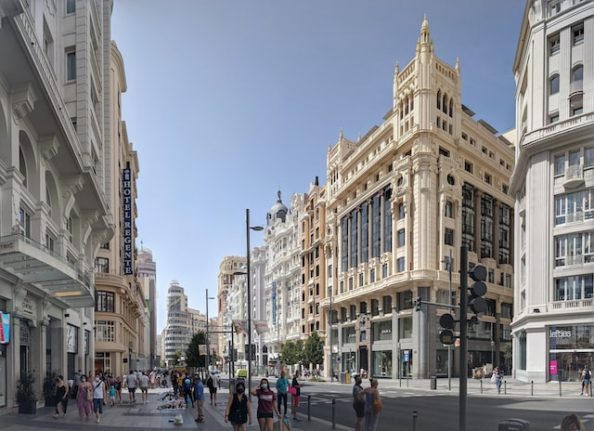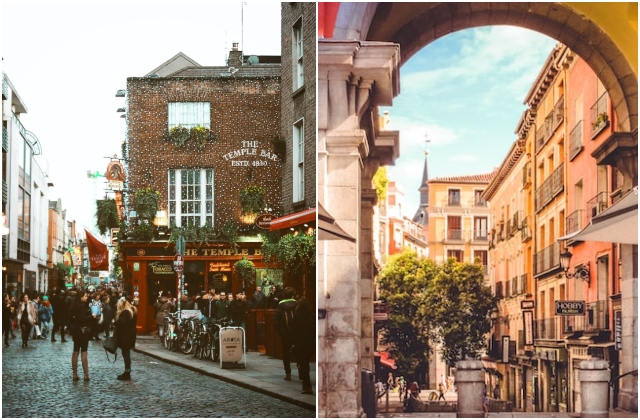More than a million people in Ireland (out of a population of 5 million) are struggling to make ends meet.
That’s according to the Irish government’s latest Behaviour & Attitudes (B&A) survey, which also saw four in five Irish people acknowledge that they have less money than a year ago.
Ireland’s cost-of-living and housing crises are affecting young people in particular, so much so that another survey carried out for the National Youth Council of Ireland (NYCI) found that 70 percent of 18- to 24-year-olds in the country are considering moving overseas.
Finding a home to rent in Dublin for under €2,000 has become almost impossible, even small one-bedroom flats are going for €1,500.
So, could Spain’s capital offer what young Irish workers and graduates are after? Madrid is certainly an exciting and varied city with lots to offer, and although it’s not on the coast, it certainly boasts better weather than the Irish capital.
READ ALSO: Where do Spain’s Irish residents live?
Is it possible for Irish people to find work and accommodation in Madrid relatively easily and have enough money to cover costs and save up?
English teacher Cormac Breen, who swapped Dublin for Madrid, explains what his countrymen should factor in.
Average wages
As of 2022, the minimum monthly salary in Spain stands at €1,166 gross for a 40-hour work week. Despite this, the average monthly salary in Madrid is about €2,000 gross, about €300 higher than the national average.
Comparing this to Dublin, where the average weekly wage in 2022 is €850 a week, or about €3,683 gross per month, it is clear to see that salaries are much higher in Ireland.
Earning considerably less may worry you, but as you read through this article, you’ll see how you will also be spending less in Madrid than in Dublin.
Job prospects
You’re probably familiar with the fact that Spain isn’t renowned for its great career prospects, but native English speakers often find they can access jobs that aren’t as easily available to Spaniards.
Many of them work in the education sector as teachers, particularly in private language academies.
Salaries range from about €1,200 to €1,400 a month net for about a 30-hour working week but with fluency in English being such a sought-after skill in Spain, there are endless opportunities to supplement your income with private classes which can earn you about €15 to €25 per hour. After Brexit, there are fewer UK nationals who can move to Spain to work as language teachers, so young Irish people will find it easier to get work and take advantage of their EU status.
READ ALSO: The most in-demand jobs in Spain in 2022
There’s also remote working for a company, Irish or otherwise, from Madrid. The rules on remote working from Spain are a bit of a grey area sometimes, but you will generally be expected to pay taxes in Spain if you settle here.
The Spanish government is also set to introduce a new startups law and digital nomad visa which will go a long way to remove the current bureaucratic hurdles that exist for non-Spanish residents wishing to work remotely from the country. Although this visa is aimed at non-EU remote workers, there are parts of the legislation which are geared towards making Spain a better place to set up a business, including for Irish and other EU nationals.
READ ALSO: New self-employed workers in Madrid to pay no social security tax
Accommodation
Irish salaries are among the highest in Europe but so are rental prices, with Dublin in particular proving to be very expensive to live in (recent figures place the average monthly rent in Dublin at just under €2,000).
According to comparison website Expatistan.com, on average housing in Dublin is about 79 percent more expensive than in Madrid.
If you’re looking to rent a place for yourself, or to share, prices in Madrid city centre will of course be higher, especially in more touristy areas and trendy neighbourhoods such as Chueca and Malasaña.
Finding a place slightly outside the centre can often offer cheaper rents, and more modern buildings. Renting a studio flat will cost you about €800 to €1,000 a month while a one or two-bedroom apartment can cost upwards of €1,200 per month.
Sharing a room is the most economical choice in Madrid, with a room in a shared flat costing on average about €400 to €600 a month.
It’s worth remembering as well that finding a place to rent in Spain’s big cities is also becoming harder than it was, even though prices and the lack of rental units isn’t as severe as in Ireland.
READ MORE:
- Stricter requirements and screenings – Why it’s getting harder to rent in Spain
- Irish property hunters are buying twice as many homes in Spain

Utilities
Like most European countries, Spain has seen a sharp increase in the cost of utilities, with heating and electricity in particular becoming much more expensive. Even so, it may still work out to be cheaper than bills in Ireland, where the average household’s annual electricity bill in 2022 is expected to be €2,120.
All in all, you can expect to pay about €50 to €80 a month if you are sharing a flat in Madrid, with bills rising to about €100 to €130 per month if you rent a studio or one-bedroom flat.
Spanish homes normally have to pay for heating, electricity, water and internet access. How much you pay a month will largely depend on your usage, and whether you are sharing a flat or renting your own place.
Water tends to be the cheapest utility, costing about €10 to €20 per month. Shopping around can help you find the best deal on internet packages which often come with landlines or mobile services included. Prices start at €20 per month depending on whether you want to pay just for wi-fi access, and what speed of internet connection you want.
Transport
Dublin is the second most expensive city in Europe for public transport costs. Spain and Madrid on the other hand have recently introduced big discounts on public transport (or made it completely free) to help people deal with rising inflation.
Madrid has an extensive public transport network, incorporating metro, bus and light rail along with a range of individual options such as bike and scooter hire schemes. Having a car in the centre is not really necessary given the costs involved with parking and fuel, and most people prefer to take advantage of public transport as their primary means of commuting to work and moving around the city.
Transportes Madrid offers a range of options for those wishing to take advantage of the vast transport network, with the monthly pass by far being the most popular. For a 30-day pass, giving unlimited access to the entire transport network, prices start at about €25 for under 26’s, rising to about €55 for anyone above this age. In an effort to tackle costs, the transport authority introduced an almost 50 percent reduction on the cost of a 30-day pass meaning that someone under the age of 26 can expect to pay as little as €10 euro for their monthly pass, while someone availing of the standard rate now pays about €32.
READ ALSO: 12 Madrid life hacks that will make you feel like a local

Enjoying life in Madrid
Dublin residents will know full well that eating out or having drinks can be pretty expensive. Not so in the Spanish capital.
From restaurants, museums, theatres and trendy bars to nightclubs, food markets and sports, Madrid has something for everyone.
And even if you’re on a tight budget, you won’t miss out on what this city has to offer.
A night out in Madrid usually involves food and alcohol. A glass of beer or wine in a modest city centre bar or terrace, can cost as little as €2 or €3 while a copa such as a gin and tonic, can cost about €7 or €8. Trendy wine and vermouth bars, cheap and cheerful cervecerías, late night dance bars, and some of the best nightclubs in Europe, Madrid’s nightlife has something for everyone.
A meal in a standard restaurant can cost from €20 to €25 for two courses and a drink between two people. For €12 to €15, you get a two-course meal, along with a dessert and drink as part of the popular menú del día.
The city contains impressive and sometimes free public amenities, such as parks, gyms, swimming pools, sports pitches, museums, exhibitions, and theatres. A monthly gym membership costs between €20 to €40. Tickets to live music or cultural performances can cost as little as €10, but range upwards towards €100 for international acts. Madrid unfortunately lacks a beach, but it is very close to the mountains where you can enjoy hiking all year round, and for those with a bit of extra cash, skiing in the winter.
Madrid costs breakdown
With the above considerations in mind, here is how much you should expect to spend living in Madrid as a single person, renting a room in a city centre flat on a monthly income of about €1,600.
Rent: €600
Utilities: €50 – €80
Transport: €10 – €30
Food: €200-€300
Activities/Entertainment: €100+



 Please whitelist us to continue reading.
Please whitelist us to continue reading.
Member comments